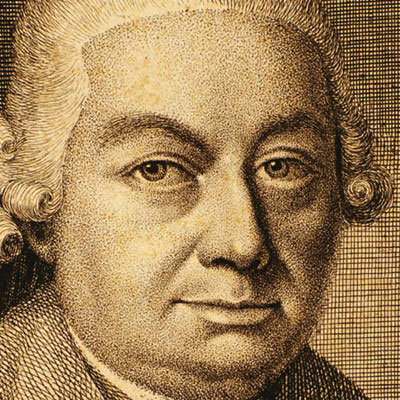
C.P.E. Bach
Born: 1714
Died: 1788
Carl Philipp Emanuel Bach
Carl Philipp Emanuel’s music is eminently approachable, full of quirky, angular subjects which swoop in unexpectedly, with virile, bustling allegros and pensive, yearning slow movements of surprising candidness, whirling passages for the soloists’ fingers in the concertos, and plenty of wit and exuberance.
Explore
Top 10 CPE Bach Recordings
Ten of the best recordings of CPE Bach's music, featuring Emmanuel Pahud, Rachel Podger, Marc-André Hamelin, Trevor Pinnock and more. Read the Top 10
A biography
CPE Bach was the second (surviving) son of Johann Sebastian Bach. After lessons with his father he studied law before turning to music. The flute-playing Frederick the Great of Prussia hired him as a keyboard player when he was crown prince and, on becoming king in 1740, appointed him as chamber musician to his court in Potsdam. Carl Philipp Emanuel stayed there for the next 28 years, awaiting the royal call to make music and composing a vast amount of varied music in the anterooms between times. He also wrote a remarkable book, Essay on the True Art of Playing Keyboard Instruments, which is one of the most explicit and informative testimonies we have on how music was played in the 18th century. After Berlin and Potsdam, CPE moved to Hamburg to succeed his godfather Telemann as director of music of the five main churches. Here he remained for the rest of his life.
Apart from his influential book, CPE Bach’s importance in musical history rests on his pioneering of the Sonata-Symphony. Instead of the musically disconnected separate movements (suites) fashionable hitherto, CPE thought about contrasting different moods and developing the thematic material in certain ways. In both his orchestral and keyboard writing you can hear these thematic contrasts heightening the drama in the music. A transitional composer – his earliest works appeared when his father was still alive – he led the way into the new Classical period and even (in some works) presaged the later Romantic school with works of clear personal emotional involvement. Carl Philipp Emanuel’s music is eminently approachable, full of quirky, angular subjects which swoop in unexpectedly, with virile, bustling allegros and pensive, yearning slow movements of surprising candidness, whirling passages for the soloists’ fingers in the concertos, and plenty of wit and exuberance.
Gramophone Podcast

Gramophone Digital Club
- Digital Edition
- Digital Archive
- Reviews Database
- Full website access
From £8.75 / month
Subscribe
Gramophone Full Club
- Print Edition
- Digital Edition
- Digital Archive
- Reviews Database
- Full website access
From £11.00 / month
Subscribe
If you are a library, university or other organisation that would be interested in an institutional subscription to Gramophone please click here for further information.





